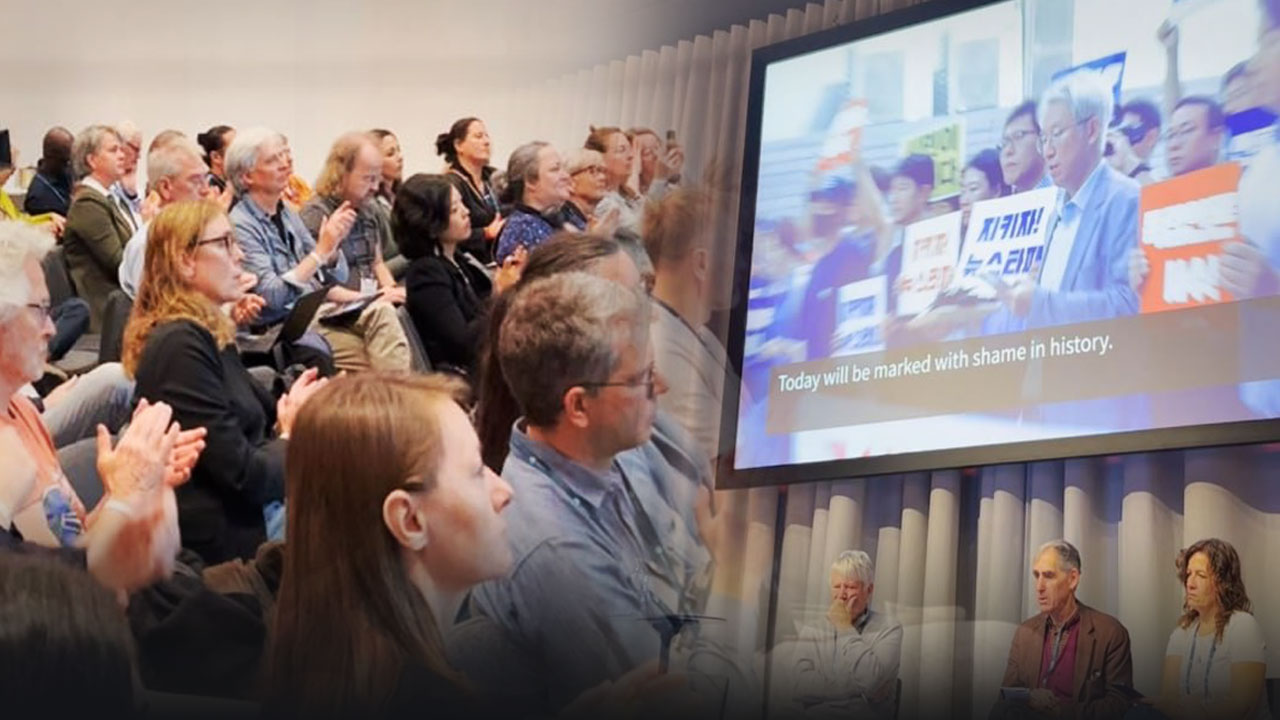
Global journalists "Stand with Newstapa"
2023년 09월 27일 14시 19분
Former Korean dictator regime under Chun Doo-hwan was found to have exerted its utmost effort to counteract to The New York Times contributors’ opinion pieces that criticized his regime in 1986 and 1987, when the public demand for direct presidential election was rising than ever.
According to recently declassified diplomatic cables from Ministry of Foreign Affairs, the ministry and a number of other government ministries moved busily to deliver complaints and messages of pressure to the U.S. government via all possible diplomatic networks.
These actions were taken to suppress opinion articles contributed by foreigners residing in Korea.

In early 1986, the long-standing dictator regime of Marcos came to an end in the Philippines as a result of civil uprising. During that time in Korea, another movement demanding a Constitutional amendment to implement the direct presidential election was rising centered from the opposition party and democracy activists.

Soon, an opinion piece by former U.S. Ambassador to El Salvador Robert E. White was published on The New York Times’ op-ed page on April 2, 1986. The piece, titled ‘Enough Timidity Toward Seoul’, introduced American readers to the political circumstances in Korea and suggested how Washington must react diplomatically.

In this piece, White explained that the Chun administration continued detaining and torturing liberal civic activists, student movement leaders and labor union activists despite the nationwide demand for direct presidential election.
He then suggested that Washington needs to move proactively to communicate with Kim Young-sam and Kim Dae-jung, two representative liberal politicians with highest possibility to be elected as the next president, and religious leaders like Rev. Moon Ik-hwan and Cardinal Kim Sou-hwan who actively opposed to Chun’s dictator regime.
An illustration, which was included in the piece, represented such political circumstances metaphorically.

Just a couple of days after the piece was published, the Korean Foreign Ministry seemed to have moved urgently according to the diplomatic cables. The ministry sent an official letter to the Consulate General in New York on April 4 ordering it to send a letter of complaint to the NYT. Another order received was to grab a number of local Korean residents to write another complaint to the news organization. The Consulate General immediately carried out the order.

The Foreign Ministry sent out another letter to the Korean Ambassador to the U.S. on the same day, ordering it to call the attention of U.S. Department of State that the NYT opinion piece insulted the Korean national flag. The Korean government basically aimed to put pressure on the NYT through the American government.

Following the Korean Embassy’s complaint, the U.S. Department of State responded that the influence of government on the press is only limited. The embassy had no other options left but to simply report it to the Foreign Ministry at home.

Ten months later, another opinion piece about Korean political climate was published on the NYT on February 23, 1987, when the entire nation was shaking due to the university student Park Jong-chul’s death from severe tortures.

This piece was written by Edward Poitras, an American pastor-professor who was teaching at Methodist Theological University in Seoul under his Korean name Park Dae-in. He criticized the violence of Chun’s dictator regime and argued that Washington has to assist the Korean public to oust Chun by implementing the direct presidential election.

The Foreign Ministry, which again came under fire, immediately ordered the Korean Ambassador to the USA to come up with a solution. The Embassy filed complaints to the NYT Editor-in-Chief and Assistant Secretary of State for East Asian and Pacific Affairs.
This time, the Foreign Ministry also submitted a complaint to the U.S. Embassy to Korea, but it received a similar response that there’s nothing much the government is able to do to media coverages.

The Chun regime, which felt that it was impossible to stop American media’s news stories criticizing itself, started directly pressure Poitras. Led by the Blue House, a vast range of government departments, including the Agency for National Security Planning (currently the National Intelligence Service), Ministry of Justice and Ministry of Education, had a collaborative meeting to set up strategies to suppress Poitras.
The plans included rejecting extension of his stay in Korea, which practically meant deportation.

Head of Seoul Immigration Office, an agency under Ministry of Justice, called him in to his office and tried to reprimand him for contributing an opinion piece to the NYT.
At the meeting, Poitras was found to have said he “just tried to inform Americans about the circumstances in Korea from an American’s view,” adding that he “does not regret contributing the piece.”
“If the Korean government takes a measure on his [immigration] status, I won’t just sit back and bear it,” he said. “I will keep fighting as much as I can.”
The government concluded that “rejecting Poitras’ visa extension request may lead him become an extremist anti-Korea figure,” according to the document. This judgment was to watch his further actions after extending the visa by six months.

Ministry of Education pressured the Methodist Theological University to give disadvantages to Poitras.
Song Gil-sop, then-Dean of the university, responded to the Education Ministry’s order that he agreed that foreigners’ raising voices on Korean political matters may cause troubles, promising the ministry that he will carry out an action on Poitras on his discretion.
But afterwards, Song was reported to have protected Poitras, instead of taking any punitive measures.
뉴스타파는 권력과 자본의 간섭을 받지 않고 진실만을 보도하기 위해, 광고나 협찬 없이 오직 후원회원들의 회비로만 제작됩니다. 월 1만원 후원으로 더 나은 세상을 만들어주세요.